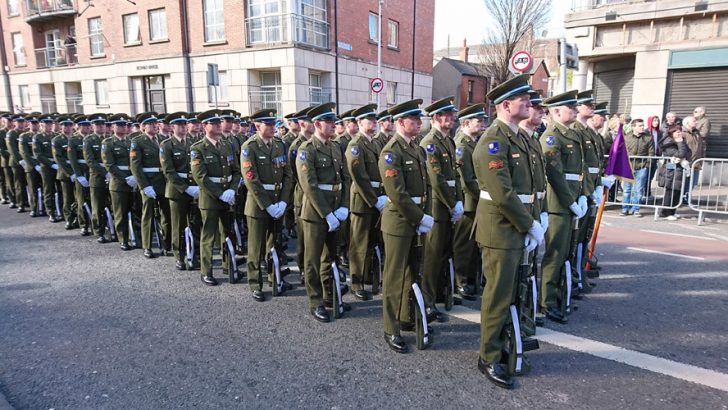“Most of the men and women of 1916 would not, I think, disapprove of the separation of Church and State”, writes Mary Kenny
How would the leaders of 1916 see Ireland today? I believe they would see much of which they would approve. They would, surely, be thankful to see that poverty has so very greatly reduced, even though there are real problems with issues like housing. They would be glad to see so many well-educated young people. I think they would find, in the rhythm of Irish life – and of diaspora life – a sense of patriotism and of pride in the country.
Pearse would be disappointed that the Irish language has not flourished as envisaged, but as an educationalist he might also be critical of the less than inspiring way it has sometimes been taught. They would be disappointed about the partition of Ireland, but some would not be surprised.
Obviously, much would puzzle them, as, if we were to travel a hundred years hence, much would puzzle us.
Separation
Most of the men and women of 1916 would not, I think, disapprove of the separation of Church and State. The Gaelic League and early Sinn Féin were not sectarian movements, and the notion of “rendering unto Caesar what is Caesar’s” derives directly from the New Testament.
And yet, I imagine they’d feel sad to see how very secularised the Christian feasts have become, and how periods like Holy Week and Easter seem, in Ireland (as elsewhere) so emptied of spiritual meaning: how often Easter seems more a signal for gardening, shopping and do-it-yourself home repairs than redemption.
I’ve heard younger Irish people, returning from a trip to Spain, exclaiming in wonder about the processions, the public ceremonies, the rituals and sense of community involvement with Holy Week and Easter Week. They’ve never seen anything like it. Of course they haven’t: because we have lost these traditions, and the beauty and holiness that went with them.
Constance Markievicz was a fascinating historical personality
There are at least three facts we know about Constance Markievicz: that she was the first woman to be elected to the House of Commons in 1918 – but refused to take her seat, because feminism took second place to her commitment to Ireland’s independence. That she was a convert to Catholicism. And that she was adored by the Dublin poor, who showed up in great numbers at her funeral in 1927.
Other areas of her life are more ambiguous. It is claimed that she shot dead an unarmed policeman during the 1916 events, but, according to a new biography by Lauren Arrington, this has not been verified. She is usually described as “Countess” Markievicz, but the Polish title may not be authenticated (although her husband Casimir was landed gentry – as she had been). It is claimed that her relationship with James Connolly may have been an amorous one, but that is not proven (he was her hero, so it was probably platonically romantic). Connolly influenced her towards Marxism, and she may have influenced him towards accepting the last sacraments.
In his well-known contemporary account, The Victory of Sinn Féin, P.S. O’Hegarty was highly critical of Madame. He claims that most women favoured the 1921 Anglo-Irish Treaty, but Constance, along with Mary MacSwiney, swayed the nationalist women into opposing it. Constance was, for these Treaty reasons, hostile to Michael Collins.
Constance Markieviecz was not the undiluted heroine that some of her followers have imagined, yet she surely was a fascinating personality and a major historical figure: warts and all.
Seanad should correct flaws in legislation
One way in which we could honour the memory of 1916, it’s been suggested, is to reform the Seanad, and construct an Upper House which would be worthy of inheriting the ideals that Irish patriots fought for.
An ideal Seanad would be a robust scrutinising and revising chamber in which bills passed by the Dáil would be subjected to meticulous and conscientious examination by senators.
This would call for senators with a strong commitment to serving the common good and a well-developed conscience. And, notably, men and women who are not (or no longer) ambitious for political advancement for themselves.
In reforming the Seanad, too much emphasis is laid on procedure – how to vote in a more ‘democratic’ Upper House. More stress should be laid on outcome, rather than process. An Upper House need not be procedurally democratic – if it were, it would be a competitor for the Dáil, rather than being complementary – and it should never include candidates who actually want to be TDs rather than senators.
We need freedom of conscience in parliamentary voting, and a Seanad which does not act as a rubber stamp to the Dáil, but as a correction to the flaws in legislation.
Mary Kenny will speak at St Michan’s Church, Dublin 8, at 2pm on Easter Monday on the theme of the nuns and friars who ministered in the streets of Dublin in 1916.


 Mary Kenny
Mary Kenny The Easter Sunday Parade celebrating the 1916 rising
The Easter Sunday Parade celebrating the 1916 rising